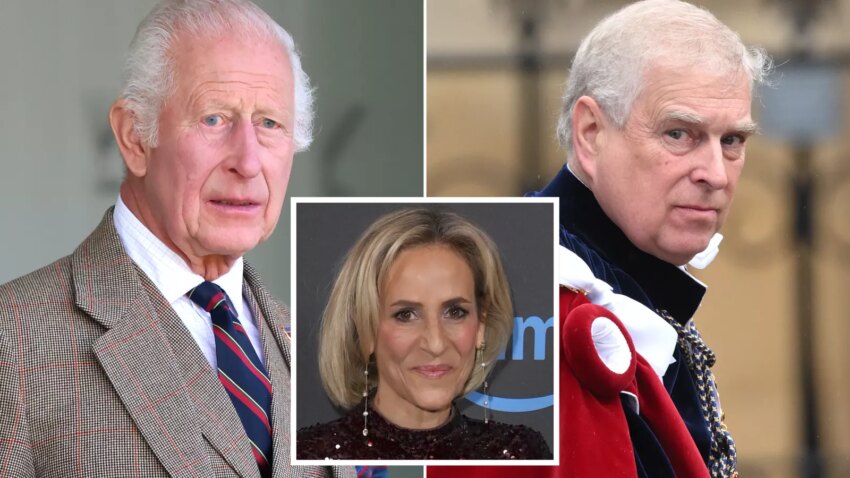In a saga that seems more like a dramatic soap opera than real life, Prince Andrew finds himself in a precarious situation as he clings to the Royal Lodge, a property that has become a symbol of his fading royal status.
Recent insights reveal a tangled web of family dynamics and personal choices that have led to this moment of crisis for the Duke of York.
The backdrop of this unfolding drama is set against the backdrop of King Charles III’s attempts to navigate a family crisis with both authority and compassion.
As the dust settles from decades of privilege, Andrew is left grappling with the reality that his once-untouchable position is crumbling.
It’s almost poetic, isn’t it?
The very person who once commanded attention now finds himself fighting to remain relevant.
According to Robert Hardman’s latest biography, it turns out that even the late Queen Elizabeth II wanted her son out of the lavish Royal Lodge.
This revelation is striking, especially considering she was often seen as his biggest supporter.
When your own mother thinks it’s time to downsize, you know things have taken a turn for the worse.
King Charles has shown remarkable patience in dealing with Andrew’s antics, even offering him Frogmore Cottage—the same residence that sparked a public outcry when Harry and Meghan lost it.
Yet, Andrew’s refusal to budge feels reminiscent of a child refusing to share their favorite toy.
This isn’t just any toy, though; it’s a 30 million dollar mansion that requires significant upkeep, a fact that seems lost on him.
Speaking of upkeep, let’s talk about the financial implications.
Andrew is reportedly paying £250 a week for a property worth millions.
It raises eyebrows, doesn’t it?
How does one justify such an arrangement?
He signed a 75-year lease back in 2003, giving him legal grounds to stay, but one can’t help but wonder if this is truly sustainable.
What’s even more concerning is Andrew’s desire to pass the Royal Lodge down to his daughters, Eugenie and Beatrice.
While these young women have handled their father’s disgrace with poise, inheriting a property they can’t afford would be more of a burden than a blessing.
It’s like handing them a ticking time bomb, waiting to explode into a financial disaster.
The strain on Andrew’s finances stems from his own choices—choices that led to his association with Jeffrey Epstein and the fallout from a disastrous interview that ultimately cost him his royal titles.
Actions have consequences, and Andrew is living proof of that harsh reality.
King Charles’s approach to handling Andrew’s situation has been commendable, especially considering the circumstances surrounding Sarah Ferguson’s health.
Offering grace during a family crisis shows a level of maturity that Andrew seems to lack.
Instead of gratitude, Andrew appears to be dismissing his brother’s attempts to help, which is truly disheartening.
Meanwhile, other members of the royal family, such as William and Catherine, are setting a stark contrast with their dedication to duty.
Even amidst personal challenges, they continue to represent the monarchy with dignity and commitment.
It’s a reminder of how different attitudes can shape public perception.
As Charles strives to modernize the monarchy, Andrew’s desperation to cling to his privileges stands in stark opposition.
It’s as if he’s stuck in a time warp, unwilling to accept that the world has moved on without him.
The weariness expressed by sources close to the situation highlights a common frustration: sometimes, you can’t help those who refuse to help themselves.
Amidst all this turmoil, the timing couldn’t be more telling.
With Sarah Ferguson announcing successful cancer treatment, the spotlight shifts back to Andrew, intensifying the scrutiny he faces.
His belief that he’s somehow winning by staying in Royal Lodge is misguided at best.
Is isolation and a crumbling relationship with his brother truly a victory?
The irony is palpable.
While Andrew fights to maintain a semblance of his former life, the working royals are out there demonstrating what true service looks like.
They’re not entangled in property disputes; instead, they focus on their responsibilities and charitable endeavors.
Each day Andrew remains at Royal Lodge only serves to distract from the important work being done by others.
As we watch this royal drama unfold, it becomes clear that Andrew’s struggle is not just about a house.
It’s about his identity and the desperate attempt to hold onto a status that has long since slipped away.
The lessons here are profound, reminding us that sometimes, the greatest obstacles we face are the ones we create for ourselves.
